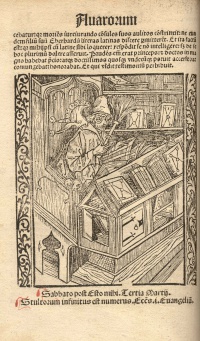Mania
From The Art and Popular Culture Encyclopedia
|
"To each his own peculiar mania" "Alton, a clerk in England [...] did not show the slightest trace of emotion, and gave no explanation of the motive or circumstances of his horrible deed. He was a psychopathic individual, and occasionally subject to fits of depression with taedium vitae. His father had had an attack of acute mania. A near relative suffered from mania with homicidal impulses. A. was executed."--Psychopathia Sexualis (1886) by Richard Freiherr von Krafft-Ebing |
|
Related e |
|
Featured: |
Mania is a severe medical condition characterized by extremely elevated mood, energy, and unusual thought patterns. There are several possible causes for mania, but it is most often associated with bipolar disorder, where episodes of mania may cyclically alternate with episodes of clinical depression. Though the elevated mood and energy level typical of mania could be seen as a benefit, mania generally has many undesirable consequences and has the potential to be very destructive. Classic symptoms include rapid speech, racing thoughts, decreased need for sleep, hypersexuality, euphoria, grandiosity, irritability, and increased interest in goal-directed activities. Mild forms of mania, known as hypomania, cause little or no impairment; more severe forms of mania do cause impairment and may even feature grandiose delusions or hallucinations. In the most extreme cases, manic patients may need to be hospitalized to protect themselves and others. Mania and hypomania have also been associated with creativity and artistic talent.
Symptoms
Although "severely elevated mood" sounds somewhat desirable and enjoyable, the experience of mania is often quite unpleasant and sometimes disturbing, if not frightening, for the person involved (and those close to them), and may lead to impulsive behavior that may later be regretted. It can also often be complicated by the sufferer's lack of judgment and insight regarding periods of exacerbation of symptoms. Manic patients are frequently grandiose, irritable, belligerent, and frequently deny anything is wrong with them. Because mania frequently encourages high energy and decreased perception of need or ability to sleep, within a few days of a manic cycle, sleep-deprived psychosis may appear, further complicating the ability to think clearly. Racing thoughts and misperceptions lead to frustration and decreased ability to communicate with others.
In addition to decreased need for sleep, other manic symptoms include irritability, anger or rage, delusions, hypersensitivity, hypersexuality, hyper-religiosity, hyperactivity, racing thoughts, talkativeness or rapid speech, and grandiose ideas and plans. In manic and less severe, hypomanic cases, the afflicted person may engage in out of character behaviour such as questionable business transactions, wasteful expenditures of money, risky sexual activity or highly vocal arguments uncharacteristic of previous behaviors. These behaviors increase stress in personal relationships, problems at work and increases the risk of altercations with law enforcement as well as being at high risk of impulsively taking part in activities potentially harmful to self and others.
A mnemonic used to remember the symptoms of mania is DIGFAST:
- D = Distractibility
- I = Indiscretion
- G = Grandiosity
- F = Flight of ideas
- A = Activity increased
- S = Sleep (decreased need for)
- T = Talkativeness (pressured speech)
See also
- Theia mania
- Mania (mythology)
- -mania (suffix)
- Bibliomania
- Bipolar disorder
- Clinical depression
- Graphomania
- Hypomania
- Maniac
- Monomania
- Pyromania


